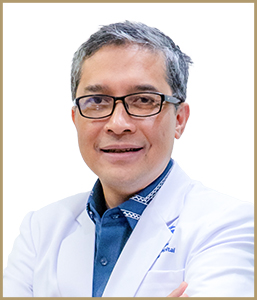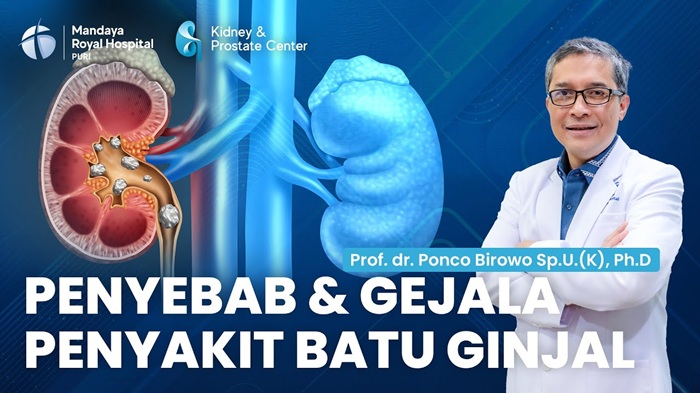Kidney stones are among the most common urinary tract disorders found in the community. This condition occurs when substances in the urine—such as salts and minerals—crystallize and form hard deposits inside the kidneys. If left untreated, kidney stones can cause severe pain, urinary tract infections, and even permanent kidney damage.
According to Prof. dr. Ponco Birowo, Sp.U(K), Ph.D, a urology specialist from Mandaya Royal Hospital Puri, most cases of kidney stones result from a combination of unhealthy lifestyle habits, genetic predisposition, and poor daily routines that negatively affect urinary health.
In his educational video, Prof. Ponco provides a detailed explanation of the main causes and symptoms of kidney stones that the public should be aware of.
Contents
Causes of Kidney Stones to Watch Out For
Prof. Ponco outlines several key factors that can lead to the formation of kidney stones:
1. Insufficient Water Intake
One of the most common causes of kidney stones is not drinking enough water. Dehydration causes urine to become more concentrated, allowing minerals to crystallize and form stones.
2. High-Salt and High-Protein Diet
A diet high in salt increases calcium levels in the urine, which can trigger stone formation—especially when not balanced with adequate hydration. Excessive animal protein intake can also raise uric acid levels, contributing to stone development.
3. Holding Urination and Urinary Tract Infections (UTIs)
Holding urine for long periods allows salts and minerals in the urine to settle and form crystals. Untreated urinary tract infections may also spread to the kidneys and lead to struvite stones.
4. Genetic Factors and Family History
Some people inherit a genetic predisposition to form kidney stones. Certain inherited conditions can cause the kidneys to release too much calcium, oxalate, or cystine into the urine, increasing the risk of stone buildup.
Additionally, specific genetic mutations can affect how the body metabolizes certain substances, leading to higher concentrations of stone-forming compounds in the urine.
5. Obesity and Lack of Exercise
According to Prof. Ponco, being overweight or not engaging in enough physical activity can increase the risk of developing kidney stones.
6. Congenital or Medical Conditions
Certain anatomical or medical abnormalities can predispose a person to kidney stones. For example, a naturally narrow urinary tract can make it easier for stones to form.
Symptoms of Kidney Stones
Symptoms of kidney stones vary depending on their size and location, but the most common signs include:
- Sharp pain in the lower back or side (flank pain)
- Urine that appears reddish, cloudy, or contains small sand-like particles
- Nausea and vomiting
- Pain or burning sensation during urination
- Frequent urge to urinate or feeling of incomplete urination
- Fever and chills (if accompanied by infection)
If you experience any of the symptoms above, it’s important to consult a doctor immediately. Early diagnosis and treatment can prevent serious complications.
Profile and Consultation Schedule of Prof. dr. Ponco Birowo, Sp.U(K), Ph.D

Prof. dr. Ponco Birowo, Sp.U(K), Ph.D is one of Indonesia’s leading urology specialists with extensive experience in diagnosing and treating various urinary tract, kidney, and prostate disorders.
He is widely recognized as a pioneer in robotic laser kidney stone surgery, an advanced technique that allows for greater precision and minimal discomfort.
Prof. Ponco completed his general medical and urology specialist education at the Faculty of Medicine, Universitas Indonesia, followed by a subspecialty in Andro-Urology.
His academic excellence led him to earn a Ph.D from Hannover Medical School, Germany in 2009 with the distinction of Magna Cum Laude.
He currently serves as a Professor at the Faculty of Medicine, Universitas Indonesia.
As an expert in his field, Prof. Ponco is skilled in treating a wide range of urological conditions, including:
- Kidney stones
- Prostate disorders
- Bladder dysfunctions
- Kidney abnormalities
In his medical practice, Prof. Ponco emphasizes minimally invasive surgical methods that provide optimal results with faster recovery times.
Some of the advanced techniques he frequently performs include:
- RIRS (Retrograde Intrarenal Surgery)
- PCNL (Percutaneous Nephrolithotomy)
Both procedures allow kidney stones to be removed without large incisions, ensuring greater comfort and quicker healing for patients.
Patients can consult and receive treatment from Prof. Ponco at the Mandaya Urology Center, Mandaya Royal Hospital Puri, which is equipped with modern technology and comprehensive facilities for various urological cases.
Consultation Schedule
Prof. dr. Ponco Birowo, Sp.U(K), Ph.D is available for consultation at Mandaya Royal Hospital Puri during the following hours:
- Tuesday: 16.00 – 18.00 WIB
- Thursday: 16.00 – 18.00 WIB
For an easier and more convenient visit, you can schedule your appointment with Prof. Ponco through the Chat via WhatsApp, Book Appointment feature, or the Care Dokter App, available on Google Play and the App Store, to view queue numbers and access complete visit information.



